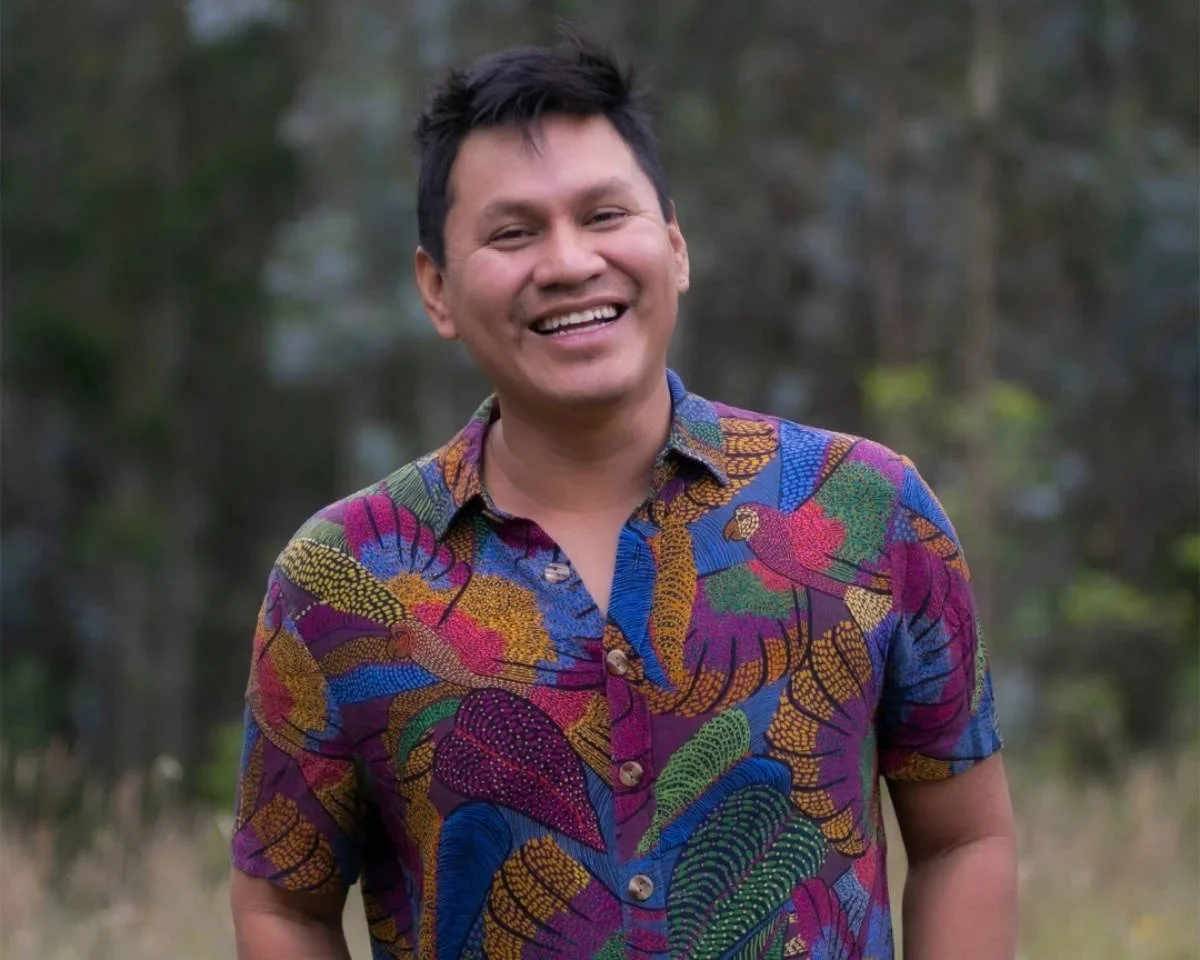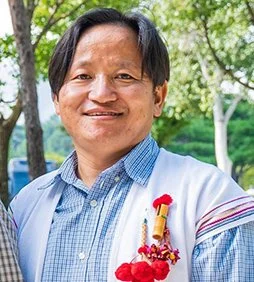Woven Launch Event COP30
Thursday November 13th, 2025
Join us on Monday November 17th, 2025 at the Indigenous Peoples Pavilion in the Blue Zone at COP30 in Belem, Brazil at 12:05-13:05 local time to learn more about this initiative, our current research project and some of the people involved.
In 2024, I was awarded the Climate Breakthrough Award, the single-largest climate philanthropy program for individuals—and Woven was born. Drawing together representatives from the seven socio-cultural regions of the world, Woven formed the first-ever Global Indigenous Advisory Council (GIAC), amplifying regional, grassroots movements to create a global impact.
In accordance with prophecy, Woven creates space for connections, collaborative action, and a global knowledge exchange—built by and for Indigenous peoples. We remain steadfast in the belief that ancestral knowledge, culture, and teachings are not a mere component, but the single-most formidable force in securing a climate-stable future. Understanding that the liberation of our communities and the liberation of our planet are intertwined, we gather Indigenous wisdom, strength, and solutions at a global scale.
Woven will support the exploration, advancement and development of cutting edge resilient climate solutions driven and guided by Indigenous peoples. We often hear about weaving western and Indigenous knowledge together, but this can often lend to Pan Indigeneity and flattening the diversity of Indigenous Peoples cultures, knowledges and strategies. Woven centers the weaving of diverse Indigenous knowledges and rights first and foremost. This will strengthen our collective strategies for sovereignty and self-determination as foundational to building and implementing effective and meaningful climate solutions.
PROJECT SUMMARY
The Woven project will not be driven by colonial processes, timelines and systems but will be rooted in bottom up climate justice and Indigenous rights based approaches. Since 1992, colonial governments have been in the driver's seat meeting to discuss ways to prevent and mitigate the climate crisis with little to no success. Every year GHG emissions rise, eco-systems crumble, high emitting industries continue unabated and there is mounting loss of human and non human life. Woven weaves the ingenuity and genius of Indigenous knowledge, our affirmed rights and our demonstrated capacities to safeguard ecosystems necessary to planetary health to drive radical climate solutions to the forefronts of the discourse.
Indigenous peoples have always been climate leaders and it is critical to shift power and advance Indigenous peoples, our rights, knowledge and solutions for a climate stable future.
Led by global Indigenous climate leaders at the forefronts of Indigenous innovation and rights advocacy we will shift narratives and strategies to tackling the climate crisis to actually reduce emissions. We will quantify the role and impacts of Indigenous land defence movements to avoid/mitigate GHG’s, and thereby increasing Indigenous Land Back efforts to support true sovereignty and self-determination. Indigenous Peoples climate initiatives and movements continue to be underfunded, undervalued and misunderstood. By building tools and resources; facilitating global Indigenous knowledge exchange platforms to weave our strengths and capacities; providing adequate resources; and changing narratives for Indigenous land back we will safeguard critical biodiversity, address historical human and Indigenous rights abuses, and bolster strategies to combat planetary collapse while reducing global Greenhouse Gas (GHG) emissions.
Speakers:
Eriel Tchekwie Deranger is a member of the Athabasca Chipewyan First Nation (ACFN) and Executive Director/Founder of Indigenous Climate Action (ICA) and 2024 winner of the global Climate Breakthrough award. Deranger is active in international Indigenous rights advocacy movements participating in various boards and UN bodies. Deranger’s work focuses on Indigenous rights, climate justice and intersectional movements. She is recognized for her role as spokespersons for her community in the international Indigenous Tar Sands Campaign. Prior to this she was a Specific Land Claims and Treaty Land Entitlement Researcher for the Federation of Sovereign Indigenous Nations.
Deranger has written for various magazines and publications; featured in documentary films including Elemental (2012); and is regularly interviewed for national and international media outlets.
Graeme Reed is a Strategic Advisor with the Assembly of First Nations (AFN), where he advocates for the inclusion of First Nations in international, national, and regional climate change and energy policy dialogues. During this, he has had the privilege of representing AFN in a wide variety of contexts, including as board member of Climate Action Network Canada (CAN-Rac), member on the Canadian Environment Domestic Advisory Group (CEDAG), and Indigenous North American Representative to the Facilitative Working Group of the Local Communities and Indigenous Peoples Platform at the UN Framework Convention on Climate Change (UNFCCC).
Leo Cerda, from the Kichwa community of Serena in the Ecuadorian Amazon, is a climate activist and Indigenous rights defender who focuses on efforts to build a more just and sustainable society. Like many Indigenous Peoples, Leo had no choice but to learn about the struggles of his people at a young age, so he started working with local grassroots organizations to create awareness about the environmental and cultural impacts caused by the oil industry. He is the Founder of the HAKHU Project, a young organization that supports community-based economic initiatives as a way to fight against exploitative oil and mining development in the Ecuadorian Amazon. Leo currently serves and works with many organizations locally and internationally, bridging indigenous community initiatives and international support.
Tiana Jakicevich, Hailing from the east coast of Aotearoa New Zealand, Tiana is a descendant of Ngāti Kahungunu ki Te Wairoa, Whakatōhea, Ngāi Tai, and Ngāi Tūhoe. Tiana is a dynamic advocate for environmental protection and climate action. With a deep connection to her tribes and the natural world, she has dedicated her work to ensuring a sustainable future for all. Tiana's leadership spans Aotearoa and the Pacific, where she is at the forefront of efforts to phase out fossil fuels and revitalise Indigenous knowledge to tackle the global climate change and biodiversity loss crises. Her vision for a just, resilient future is driven by the belief that rangatahi (youth) can create lasting, positive change.
Tunga Bhadra Rai belongs to the Rai Indigenous Nationality of Nepal. He is an Indigenous researcher and anthropologist currently working as the Director of the Climate Change Program of the Nepal Federation of Indigenous Nationalities (NEFIN) and a member of Indigenous Peoples’ Advisory Group of the Green Climate Fund (GCF). He engages in advocacy for the Indigenous Peoples’ rights at UN Framework Convention on Climate Change(UNFCCC), the GCF and other national and international fora. Mr. Rai has published articles on Indigenous Peoples.
Larissa Baldwin-Roberts is a global leader in climate activism and First Nations justice. As a Widjabul Wia-bal woman from the Bundjalung Nations, she has deep connections to her country.
Raised in a family of political activists, she has been involved in advocating for land rights, Indigenous Rights, climate justice, and cultural heritage protection. Larissa has spent over a decade supporting First Nations communities, including stopping fracking, removing fossil fuel subsidies, and increasing voting access for remote communities. She is currently the campaign director of the national campaign for Treaty. Larissa is also the Director of Research for Passing the Message Stick. As a co-founder of Seed, she created a platform for young Aboriginal and Torres Strait Islander people to protect their country and prioritise Indigenous approaches in the fight for Climate Justice. Larissa served as the CEO of GetUp and currently co-founded and leads Common Threads, an Indigenous organization focused on transforming the capability of First Nations social movements to usher in systems change through indigenous approaches to campaigning and self determination. In addition, Larissa serves as the co-Board chair of Climate Action Network International. And is one of the Pacific regional delegates for the COP30 Indigenous Peoples Commission.






